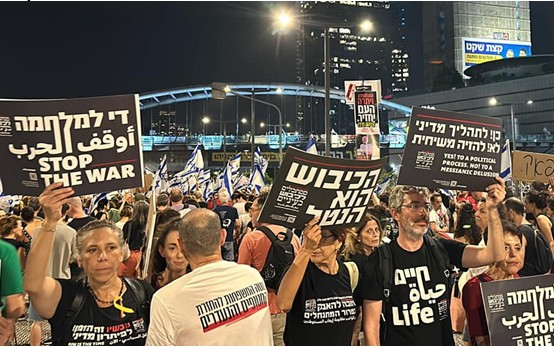Tens of thousands of citizens, 150,000 all over Israel according organizers, took to the streets and protested against the far-right ruling coalition, against the war and in support of a hostage deal on Saturday evening, June 29, in more than 80 locations across the country. The protests were larger and more impassioned than usual.
Police violence spikes at anti-government rallies. An opposition lawmaker Naama Lazimi (Labor) was violently pushed by an officer during a demonstration in Tel Aviv. “The emissaries of the criminal minister [National Security Minister Itamar Ben-Gvir] in Netanyahu’s government choked me, pulled my hair and kicked me,” she tweeted.
At the weekly protest at Jerusalem’s Paris Square, near Prime Minister Benjamin Netanyahu’s official residence, a cop was filmed cursing and threatening a protester he detained, telling him “I’ll rape your mother” and calling him a “son of a bitch.” In a separate incident, another four protesters in Jerusalem were forcefully arrested by a group of police, one of whom pinned him to the hood of a car and grabbed his neck, as surrounding protesters shouted not to choke him.
Clashes also erupted in near the Histadrut labor federation in Tel Aviv, where a rally focused on the plight of the hostages was followed by a fiery protest led by families of captives. The protesters lit a fire outside the building and urged the union chairman, Arnon Bar-David, to call a general strike and shut down the economy in order to pressure the government into reaching a deal with the Hamas to release the 120 hostages it is holding captive in Gaza and for early elections.

“Stop the war”, anti-occupation block activists at the demonstration on Tel-Aviv. At least 37,877 Palestinians have been killed and 86,969 have been wounded in Israel’s war in the Gaza Strip, Saturday, June 29, 2024 (Photo: Ra’anan Harlap)
Additional demonstrations against the far-right government led by Prime Minister Benjamin Netanyahu remain likely through at least late July. Protests have been particularly common in Jerusalem, Haifa, Beersheva, Caesarea and Tel Aviv on weekends and have typically drawn tens of thousands of participants. However, reports also indicate gatherings on weekdays in cities nationwide. Future demonstrations could focus on traditionally popular protest sites, such as prominent public squares, city centers, and government buildings across the country. Furthermore, protesters have regularly blocked the Ayalon Highway in Tel Aviv on weekends. In Jerusalem, demonstrations have occurred outside government ministries, near the Prime Minister’s Office. Localized transport disruptions are likely near all protests.
Anti-government groups have also said they are organizing a general strike and a shutdown of businesses and commerce on July 7, nine months to the day of Hamas’s deadly assault.
Related: https://maki.org.il/en/?p=31947


